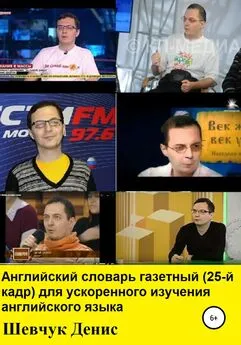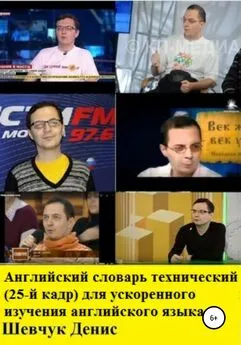Денис Шевчук - Английский язык: самоучитель
- Название:Английский язык: самоучитель
- Автор:
- Жанр:
- Издательство:неизвестно
- Год:неизвестен
- ISBN:нет данных
- Рейтинг:
- Избранное:Добавить в избранное
-
Отзывы:
-
Ваша оценка:
Денис Шевчук - Английский язык: самоучитель краткое содержание
Книга предназначена для всех желающих быстро освоить английский язык. Она может быть полезна поступающим в вузы (абитуриентам), студентам, преподавателям, бизнесменам, туристам и всем, имеющим контакты с зарубежными партнерами. Она может быть полезна как начинающим, так и продолжающим изучать английский язык.
Также даются полезные советы для прохождения интервью при приеме на работу.
Пособие разработано на базе многолетней практики преподавания английского языка по методике дистанционного образования. С его помощью можно получить достаточные знания и навыки для адекватного поведения в различных ситуациях бытового и делового общения. Active Vocabulary - новые слова и выражения урока, речевые образцы и их детальная отработка; Active Grammar - объяснение грамматики урока и упражнения на отработку данных грамматических явлений с использованием новой лексики урока; Reading and Speaking Practice - упражнения, нацеленные на отработку навыков чтения и говорения с использованием изученной лексики и грамматики; Assignment - письменное задание, составленное в форме теста. Материал уроков систематизирован по темам, названия которых приводятся в начале каждого урока. Одним из достоинствпособия является постоянная систематизация изучаемой лексики и грамматики, что позволяет максимально облегчить процесс обучения. Для повышения эффективности обучения рекомендуем выполнять упражнения, проговаривая их вслух, пересказывая все тексты и диалоги. Старайтесь произносить слова, фразы и диалоги громко, обращая особенное внимание на интонацию. При необходимости используйте компьютерные словари, дающие правильные варианты произношения слов, а также много слушайте аудио и видеозаписи, вообще голос носителей.
Английский язык: самоучитель - читать онлайн бесплатно ознакомительный отрывок
Интервал:
Закладка:
She can’t travel a long way from home.
She couldn’t travel a long way from home.
Для выражения действия в будущем времени используется выражение «be able to» – «быть способным».
I will be able to change it tomorrow.
We will be able to take a test.
He will be able to fix cars.
Will he be able to meet you?
Will they be able to join you?
He won’t (will not) be able to fly there.
I won’t be able to balance the tyre.
4. Give the sentences in the past and future.
Поставьте предложения в прошедшее и будущее .
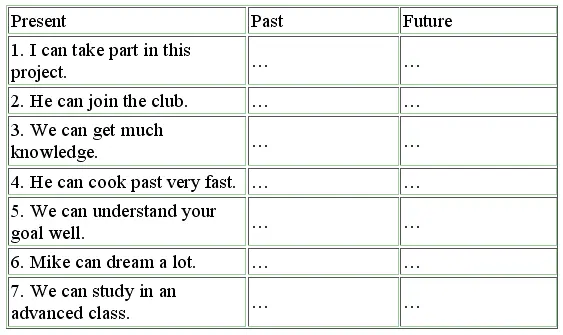
5. Ask General Questions. Give Negative answers.
Задайте общие вопросы. Дайте отрицательные ответы .

6. Complete the information chart.
Заполните таблицу .

READINGAND SPEAKING PRACTICE
1. Answer the questions.
Ответьте на вопросы.
1. Are you going to start a new life? Why/Why not?
2. What are you going to buy next week?
3. What will you be able to cook tonight?
4. What are you going to plant in your garden?
5. Will you be able to drive a long way from home today?
6. Are you going to learn how to drive?
7. Are you going to travel in summer? Where will you be able to go?
8. Are you going to be very busy next week?
9. When are you going to have a holiday?
10. Will you be able to study English next year?
2. Read and complete the conversation. Try to learn the dialogue.
Прочитайтедиалог. Вставьте реплики по смыслу. Постарайтесь выучить диалог.
A. But you can’t drive.
B. You’re going to start a new life.
C. Are you going to start now, dear?
D. Then, I’m going to get a job.
Husband: I am going to start a new life. Did you hear me?
Wife: Yes, dear.
Husband: What did I say? What am I going to do?
Wife: ..................
Husband: That’s right. And I will be able to do it! First, I’m going to buy some new clothes. .............. Did you hear me?
Wife: Yes, dear. You are going to get a job. Will you be able to do it?
Husband: Yes. Next, I’m going to buy a car.
Wife: That’s nice. .........................
Husband: That’s right. I can’t drive now. But I’ll be able to do it. I’m going to learn.
Wife: When are you going to start?
Husband: Start what?
Wife: Your new life. New clothes, job, car. .........................
Husband: No, not now. There is sport on TV.
3. Speak about your future plans. Use the words.
Расскажите о своих планах на будущее. Используйте данные слова .
Story one: am going to, travel, knowledge, easily, fluently, goal, will be able to, couldn’t, real, apart from, reasonably well.
Story Two: join, skills, different, fix, won’t be able to, am going to, beginners’ class, a long way from, change.
4. Give your reasons.
Скажите, зачем это нужно .
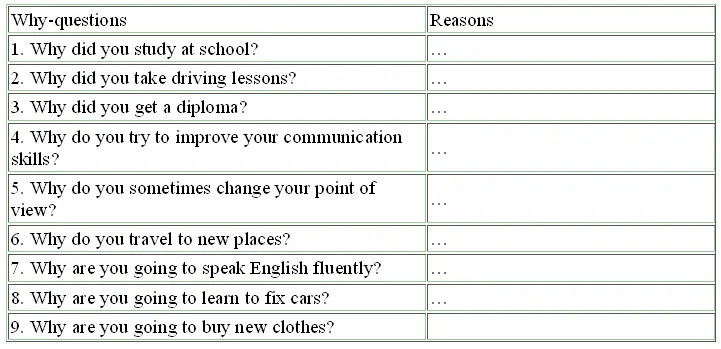
5. Order the speeches.
Расположите реплики по смыслу .
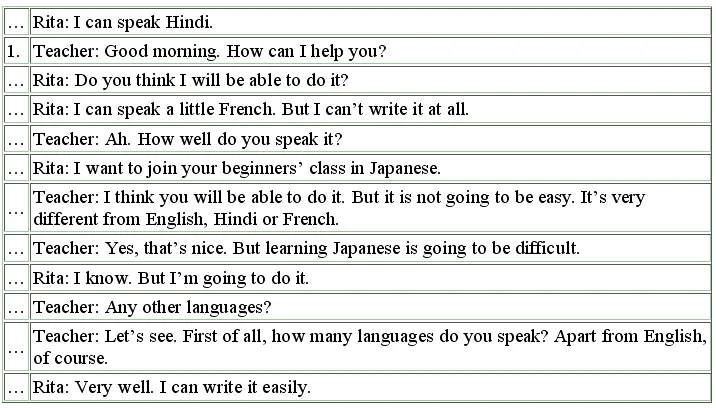
6. Read this text.
Прочитайте текст .
A practical class
Jean is a teacher in California. Josh is one of his students. Jean teaches the students how to fix cars.
His programme is a practical course. They teach people from sixteen through adults.
The courses are located on a High School campus. The programme is vocational because they train people specific skills which they can use in their job.
Josh likes these classes very much because they give real knowledge. They don’t have any textbooks. They just listen and look and then, start their projects.
All the students have their projects on how to fix a car. For example, Josh is going to take a tyre off the car, balance the tyre and put it back.
There are a lot of students who come to join the programme. All of them think that they will be able to fix their cars. It is their goal – and the programme is going to give them this knowledge. But the programme also includes: consumer awareness, communication skills and understanding of how the car works.
A. Retell the text
Перескажите текст
B. Ask five questions about the text
Задайте пять вопросов к тексту
C. Answer the questions
Ответьте на вопросы.
1. What programme does Jean teach?
2. Does he have only one student?
3. What is the age of their students?
4. How many textbooks do the students have?
5. How do the students study?
6. What is the students’ goal?
7. What skills does the programme include?
ASSIGNMENT 2
LESSON 2
Choose the correct word.
Выберите подходящее слово .
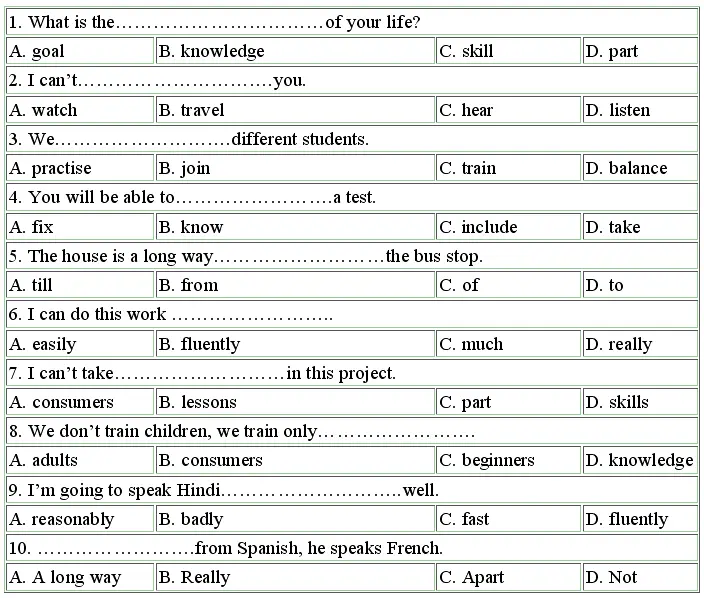
Ask Special Questions.
Задайте специальные вопросы .

Find one mistake in each sentence.
Найдите ошибку в каждом предложении .
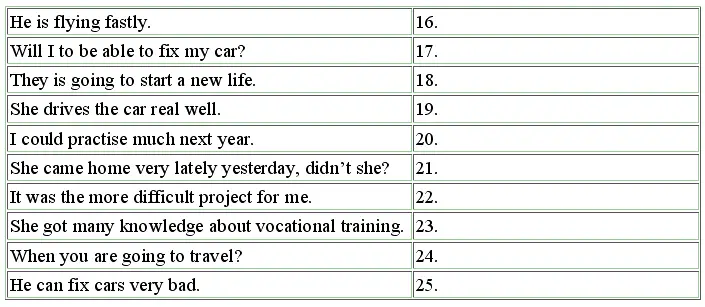
Translate the sentences.
Переведите предложения .
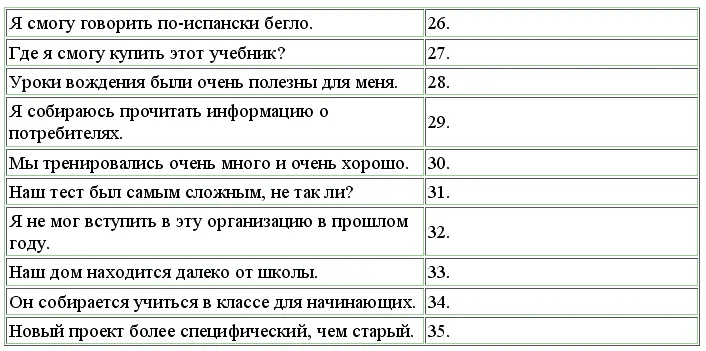
LESSON 3. Planning a trip

LEAD-IN
1. Answer the questions about yourself.
Напишите ответы на вопросы о себе .
1. Do you like to travel? Why/Why not?
2. Where did you travel last time?
3. Was it a long way from your home?
4. What foreign countries would you like to see?
5. What places are you going to visit there?
6. How are you going to communicate with people in those countries?
7. Is it difficult to choose a place to go?
8. Do you like active rest?
9. Do you like to travel with your family?
10. Will you be able to travel this summer?
2. Make up correct sentences.
Составьте предложения из данных слов.
1. won’t/to/I/speak/fluently/year/be/Japanese/able/next.
2. travel/long/home/summer/we/couldn’t/a/last/way/from.
3. Mike/part/an/took/three/ago/in/exhibition/years/to China.
4. in/spent/Tahiti/well/we/our/reasonably/holidays.
5. your/skills/on/you/improve/going/are/to/communication/holiday?
6. visit/I/not/going/specific/this/am/to/country.
7. dreaming/holidays/the/seaside/I/about/at/am.
Try to recollect as many sentences as possible.
Постарайтесь вспомнить как можно больше предложений из только что составленных .
3. Complete the information chart.
Заполните таблицу .

4. Make up sentences about travelling using the following forms.
Составьте предложения о путешествиях, используя данные формы .
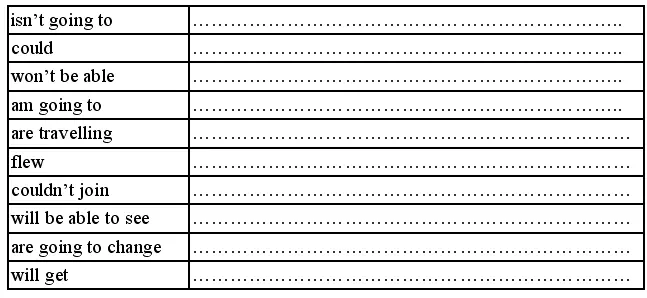
FOCUS ON VOCABULARY
Активный словарь
1. section – секция, салон (в самолете)
2. plane – самолет
by plane – самолетом, на самолете
3. passenger – пассажир
4. station – станция, вокзал
railway station – железнодорожная станция
5. tourist – турист
6. airplane – самолет
7. train – поезд
to travel by train – путешествовать поездом
8. darling – дорогой, любимый
9. service – обслуживание
10. transaction – дело, сделка
11. itinerary – маршрут
12. premium – награда, премия
13. seat – посадочное место
14. ship – корабль
by ship/by sea – на корабле
14. decision – решение
It was his final decision.
15. offer – предложение
a house on offer – предлагается дом (выставляется на продажу)
16. climate – климат
mild climate – мягкий климат
cold climate – холодный климат
17. flight – полет, перелет
It was a long flight.
18. ticket – билет
1. non-smoking – некурящий
non-smoking section of the plane – салон для некурящих в самолете
2. domestic – домашний, отечественный
3. non-stop – безостановочный
to fly non-stop – лететь без посадки
Читать дальшеИнтервал:
Закладка:









